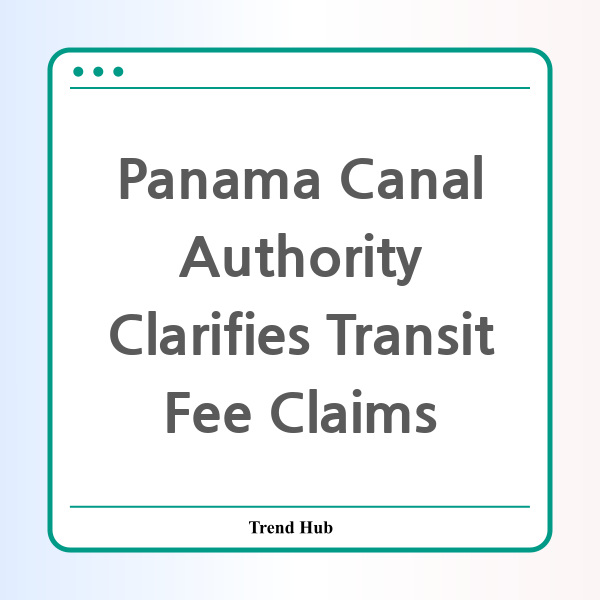* This website participates in the Amazon Affiliate Program and earns from qualifying purchases.

In a surprising turn of events, the Panama Canal Authority (ACP) has formally denied assertions made by the U.S. State Department regarding free transit for government vessels through one of the world’s most important shipping lanes. This response comes amid heightened tensions between Panama and the United States, particularly concerning the influence of China in the region.
In an official statement, the ACP emphasized that it retains the authority to set tolls and fees for transit through the Panama Canal. This clarification directly refutes a claim from the State Department that U.S. government vessels could transit the canal without incurring any fees, potentially saving millions for the U.S. government annually. "We have not made any adjustments to the tolls," the ACP stated, affirming its commitment to an ongoing dialogue with U.S. officials.
The backdrop of this dispute is significant. Over the last 26 years, the U.S. has paid approximately $25.4 million in transit fees for military ships, averaging less than $1 million a year. The Panama Canal, stretching 51 miles and serving as the nexus between the Atlantic and Pacific oceans, plays a pivotal role in global trade, with around 14,000 ships navigating its waters annually to avoid longer routes around South America.
Adding fuel to the fire, former President Donald Trump has publicly expressed his desire for the United States to "take back" control of the Panama Canal—an area that returned to Panamanian oversight in 2000. During recent statements, Trump criticized what he deemed a "foolish" decision that allowed Panama to control the canal while suggesting that China's involvement in the area constituted a breach of international agreements.
In light of these comments, Panama's President, José Raúl Mulino, has firmly rejected any notion of U.S. control over the canal. During a meeting with Secretary of State Marco Rubio, Mulino reiterated Panama’s sovereignty, assuring that the canal would remain under Panamanian administration. The President also distanced his government from allegations of Chinese influence, stating, "There is no presence of any nation in the world that interferes with our administration."
These recent developments come at a time when U.S. officials are actively seeking to address concerns regarding China's growing influence in Central America. During his trip to Panama, Secretary Rubio pressed for immediate changes regarding this perceived influence, implying that without cooperation, the U.S. might resort to necessary measures to safeguard its interests.
As we further explore the implications of these events, it’s worth noting that the ACP has indicated its willingness to work collaboratively with the U.S. Navy to optimize transit priority through the canal. This gesture highlights Panama’s intent to maintain a balanced and cooperative relationship with the U.S., despite rising tensions.
In summary, the Panama Canal remains a vital artery for global trade and is a focal point of international diplomacy. As both nations navigate this complex relationship amid external influences, the future of the canal will likely be a pivotal topic in discussions between the U.S. and Panama. The ACP's denial of the State Department's claims reiterates Panama's sovereignty and independence in managing one of the world's most essential shipping lanes. The evolving dynamic around the canal will be crucial to monitor as both nations engage in diplomatic dialogue and negotiations.
* This website participates in the Amazon Affiliate Program and earns from qualifying purchases.